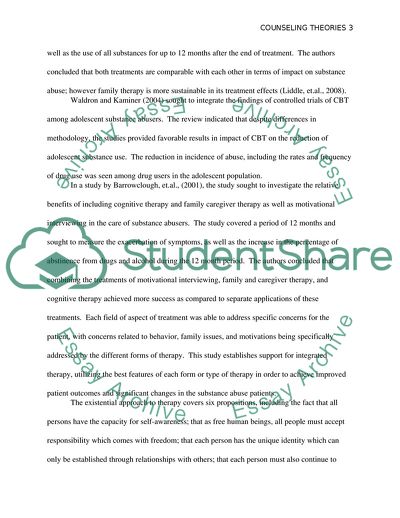Cite this document
(Counseling Theories as Applied to Substance Abuse Patients Literature review Example | Topics and Well Written Essays - 2000 words, n.d.)
Counseling Theories as Applied to Substance Abuse Patients Literature review Example | Topics and Well Written Essays - 2000 words. https://studentshare.org/psychology/1758627-three-identified-counseling-theories-1-cognitive-behavior-therapy-2-existential-therapy-3-family-systems-theory-compared-and-contrasted-as-applied-to-the-population-of-substance-abuse-clients
Counseling Theories as Applied to Substance Abuse Patients Literature review Example | Topics and Well Written Essays - 2000 words. https://studentshare.org/psychology/1758627-three-identified-counseling-theories-1-cognitive-behavior-therapy-2-existential-therapy-3-family-systems-theory-compared-and-contrasted-as-applied-to-the-population-of-substance-abuse-clients
(Counseling Theories As Applied to Substance Abuse Patients Literature Review Example | Topics and Well Written Essays - 2000 Words)
Counseling Theories As Applied to Substance Abuse Patients Literature Review Example | Topics and Well Written Essays - 2000 Words. https://studentshare.org/psychology/1758627-three-identified-counseling-theories-1-cognitive-behavior-therapy-2-existential-therapy-3-family-systems-theory-compared-and-contrasted-as-applied-to-the-population-of-substance-abuse-clients.
Counseling Theories As Applied to Substance Abuse Patients Literature Review Example | Topics and Well Written Essays - 2000 Words. https://studentshare.org/psychology/1758627-three-identified-counseling-theories-1-cognitive-behavior-therapy-2-existential-therapy-3-family-systems-theory-compared-and-contrasted-as-applied-to-the-population-of-substance-abuse-clients.
“Counseling Theories As Applied to Substance Abuse Patients Literature Review Example | Topics and Well Written Essays - 2000 Words”. https://studentshare.org/psychology/1758627-three-identified-counseling-theories-1-cognitive-behavior-therapy-2-existential-therapy-3-family-systems-theory-compared-and-contrasted-as-applied-to-the-population-of-substance-abuse-clients.


